How to Sleep Better After Intense Workouts
🌙 Introduction: Why Sleep Is the Missing Link in Recovery
You crushed your workout. The sweat is still drying, your heart rate is slowing down, and your muscles are pulsing with that satisfying fatigue that says, I pushed my limits.
But hours later, you’re tossing and turning in bed—wired, restless, and unable to drift off. Sound familiar?
Post-workout insomnia is a common issue among athletes, bodybuilders, and high-performance professionals. While exercise improves sleep in the long run, intense training can disrupt it temporarily—especially when done late in the day or when recovery systems are overstressed.
In this article, we’ll break down:
🧠 Why your body resists sleep after intense exercise
🧬 How hormones, body temperature, and nervous system activation affect rest
🌿 Supplements and nutrition strategies for faster recovery
🌬️ Breathwork and relaxation techniques to switch into “sleep mode”
🕯️ Bedtime rituals that actually help athletes fall asleep faster
Let’s dive in—because true gains happen not during training, but while you sleep.
Looking for supplements for This? Click here.
⚡ Part 1: Why It’s Hard to Sleep After Intense Training
1️⃣ Elevated Cortisol and Adrenaline
When you train hard—whether it’s heavy lifting, HIIT, or sparring rounds—your body releases adrenaline, norepinephrine, and cortisol. These are your “get-it-done” hormones.
They increase energy, sharpen focus, and mobilize glucose. Great for a workout—terrible for bedtime.
The problem: Cortisol can stay elevated for up to 3–5 hours after training, keeping your nervous system in sympathetic mode (fight-or-flight).
💡 Solution: Shift the balance toward the parasympathetic nervous system (rest-and-digest) through nutrition, hydration, and slow breathing (we’ll get to that soon).
2️⃣ High Core Body Temperature 🌡️
Exercise raises your core temperature, which can stay high for several hours. But sleep onset depends on your body cooling down—a drop in temperature signals melatonin release.
So if you train late, your body may be too warm to enter deep sleep cycles.
Quick tips:
Take a cool shower or bath 60–90 minutes before bed.
Sleep in a cool room (18–20°C / 65–68°F).
Use breathwork to slow heart rate and lower heat production.
3️⃣ Dehydration and Electrolyte Imbalance 💧
Hard training depletes sodium, magnesium, and potassium—all of which regulate muscle relaxation and sleep quality.
Even 1–2% dehydration can raise cortisol, increase heart rate, and make your body feel “on alert.”
Fix:
Rehydrate with electrolytes, not just plain water.
Add a pinch of sea salt or an electrolyte tablet to post-workout drinks.
Consider magnesium glycinate or citrate before bed (200–400 mg).
4️⃣ Post-Workout Nutrition Timing
Eating too late or too heavy can interfere with sleep because digestion keeps the body active.
But skipping food entirely increases cortisol and breaks down muscle tissue overnight.
Aim for balance:
Eat your recovery meal within 60 minutes of training.
Include protein + complex carbs + healthy fat.
Avoid excessive sugar or caffeine after your session.
🍽️ Example: Grilled chicken, sweet potato, and avocado—simple, anti-inflammatory, and satisfying.
🧬 Part 2: The Hormonal Connection Between Sleep and Recovery
💤 Sleep = Natural Anabolic State
During deep sleep, your body releases:
Growth hormone (GH): repairs muscles and burns fat.
Testosterone: rebuilds tissue and enhances motivation.
Melatonin: synchronizes circadian rhythms and acts as a powerful antioxidant.
If you don’t sleep deeply, these hormones never reach their optimal peaks. That means slower recovery, weaker performance, and higher injury risk.
🔁 Overtraining and Sleep Disruption
Overtraining increases sympathetic dominance and reduces REM sleep. Symptoms include:
Frequent waking at 2–4 a.m.
Night sweats
Elevated morning heart rate
Low motivation or irritability
If this sounds familiar, you may need a recovery week or active rest days to reset your system.
🧘 Part 3: Pre-Sleep Rituals to Calm the Nervous System

🌬️ 1️⃣ Try Breathwork for Sleep
After intense training, your breathing is often shallow—even hours later. Slow, diaphragmatic breathing helps trigger your vagus nerve and switch into parasympathetic mode.
Two powerful techniques:
🕊️ Box Breathing (4-4-4-4)
Inhale 4 sec → Hold 4 → Exhale 4 → Hold 4.
Repeat for 3–5 minutes.
🌌 4-7-8 Breathing
Inhale 4 sec → Hold 7 → Exhale 8 sec.
This pattern lowers heart rate and induces sleepiness within minutes.
Do this right after your post-workout meal or just before bed.
Want to try Breathwork? Click Here.
🛁 2️⃣ Cold-Then-Warm Contrast
A cold shower post-training helps reduce inflammation and cortisol spikes.
A warm shower or Epsom salt bath later in the evening relaxes muscles and improves blood flow.
If you train at night:
Cold shower immediately after workout 🚿
Warm bath about 90 minutes before bed 🛀
This contrast encourages your body’s natural cooling curve—ideal for sleep onset.
🕯️ 3️⃣ Create a Sleep-Ready Environment
Dim lights at least 60 minutes before bed (blue light blocks melatonin).
Avoid scrolling or gaming—these keep the brain in alert mode.
Play soothing ambient sounds, white noise, or low-tempo instrumental music.
Keep your phone outside the bedroom if possible.
💡 Pro tip: Use red or amber lighting in your bedroom after 9 p.m. to signal the brain that it’s nighttime.
🛏️ 4️⃣ Gentle Mobility or Yin Stretching
Tight muscles keep the nervous system alert. Gentle stretching or yoga before bed releases tension and promotes physical stillness.
Focus on:
Hamstrings
Hip flexors
Shoulders and neck
Pair each stretch with slow exhalations to further lower heart rate.
🍽️ Part 4: Nutrition Strategies for Post-Workout Sleep
🧘 Balance Cortisol with Carbs
If you train intensely (especially in the evening), your glycogen stores deplete. Without carbs, cortisol remains high.
Eating a small amount of complex carbohydrates in your last meal—such as oats, quinoa, or fruit—helps lower cortisol and increase serotonin, which converts to melatonin.
Example bedtime snack:
Greek yogurt + banana + cinnamon
Oatmeal with almond butter
Rice cakes with honey 🍯
🧂 Don’t Forget Minerals
Electrolytes play a huge role in muscle relaxation and nerve signaling.
Key nutrients for better post-workout sleep:
| Nutrient | Function | Best Sources |
|---|---|---|
| Magnesium | Relaxes muscles, regulates GABA | Pumpkin seeds, spinach, magnesium glycinate |
| Potassium | Prevents cramps, aids hydration | Bananas, avocados, potatoes |
| Zinc | Supports testosterone, immunity | Pumpkin seeds, beef, chickpeas |
| Calcium | Assists melatonin production | Dairy, leafy greens, sardines |
🥛 Try Sleep-Supporting Drinks
Tart Cherry Juice 🍒
Contains natural melatonin and reduces muscle soreness.
Drink 1 cup 30 minutes before bed.
Golden Milk (Turmeric + Milk) 🌼
Combines anti-inflammatory turmeric with relaxing tryptophan.
Add honey for serotonin boost.
Electrolyte-Magnesium Water 💧
A quick way to hydrate and calm muscles simultaneously.
💊 Part 5: Supplements That Help Athletes Sleep
🌿 1️⃣ Magnesium Glycinate or Threonate
Magnesium is often called the recovery mineral. It supports muscle repair, GABA activity, and melatonin synthesis.
Dosage: 200–400 mg 30–60 minutes before bed.
Avoid oxide forms (poor absorption).
🌸 2️⃣ Ashwagandha
An adaptogen that lowers cortisol, improves sleep quality, and supports hormonal balance.
Dosage: 300–600 mg standardized extract (KSM-66 ®).
🌼 3️⃣ Valerian Root
Natural sedative herb that enhances GABA signaling and shortens sleep latency.
Can be used after late-night training when you feel too wired.
Dosage: 400–900 mg root extract.
🍵 4️⃣ L-Theanine
Found in green tea; smooths brain activity by promoting alpha-waves.
Dosage: 100–200 mg with magnesium or a calming tea.
🌿 5️⃣ CBD or CBN (Optional)
Cannabinoids can reduce inflammation and aid sleep onset—but quality and dosage matter.
Choose THC-free products and start low (5–10 mg).
⚠️ A Note on Caffeine
Caffeine’s half-life is 5–6 hours. That means an afternoon pre-workout can still affect your system at midnight.
Tip:
Avoid caffeine after 2 p.m., especially if you train in the evening.
Looking for supplements for This? Click here.
🌬️ Part 6: Mind-Body Integration for Sleep
🧠 Understand the "Afterburn"
After intense exercise, your sympathetic system remains activated. You may feel mentally stimulated, even euphoric.
But this can delay melatonin and slow recovery.
The key is intentional down-regulation—a process of signaling safety to your body.
🧘 1️⃣ Meditation or Breath Counting
Just five minutes of mindful breathing before bed increases heart rate variability (HRV) and deep-sleep potential.
Try this:
Inhale slowly to count 4.
Exhale slowly to count 6.
Repeat for 10 rounds.
This longer exhale ratio tells your body: “It’s safe to rest.”
🎧 2️⃣ Soundscapes or Binaural Beats
Listening to low-frequency binaural beats (1–8 Hz) mimics theta and delta brainwave states associated with deep relaxation.
Use noise-canceling earbuds or a bedside speaker with calm frequencies or white noise.
🕯️ 3️⃣ Gratitude Journaling
Writing down 2–3 things you’re grateful for after a hard training day helps shift focus from stress to satisfaction—an emotional signal for the body to release tension.
Looking for online therapy ? Click Here.
🧩 Part 7: Ideal Evening Routine for Athletes
Here’s a timeline to help you structure your post-workout-to-sleep transition:
| Time | Action | Purpose |
|---|---|---|
| Immediately After Training | Cool down, stretch, hydrate with electrolytes | Lower heart rate, restore balance |
| Within 1 Hour | Eat recovery meal (protein + carbs + fats) | Rebuild glycogen, stabilize cortisol |
| 90 Minutes Before Bed | Shower (cold → warm contrast), dim lights | Begin thermal and hormonal wind-down |
| 60 Minutes Before Bed | No screens, drink magnesium or cherry juice | Boost melatonin, relax muscles |
| 30 Minutes Before Bed | Breathwork, light stretching, gratitude journaling | Activate parasympathetic state |
| Bedtime | Sleep in cool, dark room | Enter deep recovery mode |
Stick to this flow for one week—you’ll notice profound improvements in both sleep depth and muscle recovery.
🧠 Part 8: Sleep Quality Tracking
If you’re serious about progress, track your recovery metrics:
Heart Rate Variability (HRV): Higher = better recovery
Resting Heart Rate (RHR): Lower overnight = improved recovery
Sleep Stages: Aim for 20–25% REM and 20–25% deep sleep
Tools like Oura Ring, WHOOP, or Garmin can help identify how late training or caffeine affects your rest.
🌄 Part 9: Morning After — Optimize Your Wake-Up

How you wake affects how well you’ll sleep again.
Get natural sunlight within 30 minutes of waking 🌞
Drink water with electrolytes first thing
Move your body gently—stretch or walk
Avoid checking your phone immediately
This re-anchors your circadian rhythm, balancing melatonin and cortisol for the next cycle.
🧠 Bonus: The Psychological Side of Recovery
Post-training insomnia isn’t just physical—it’s mental. When you’re passionate about progress, your brain replays reps, sets, and goals on a loop.
To counteract:
End your day with mental closure (“Today’s work is done.”)
Visualize muscles healing and growing as you fall asleep
Use calming affirmations like “My body knows how to recover.”
You’re teaching your nervous system that recovery is productive—not lazy.
Looking for online therapy ? Click Here.
💤 Final Thoughts: Sleep Is the Ultimate Performance Enhancer
You can lift smarter, eat cleaner, and train harder—but if you’re not sleeping well, you’ll hit a plateau.
Improving post-workout sleep isn’t about perfection. It’s about balance: cooling down, rehydrating, calming your mind, and signaling to your body that the fight is over.
Because when you finally surrender to rest, your body begins its real work—rebuilding, growing, and making you stronger than yesterday. 🧘💤💪
📚 References
Dattilo, M. et al. “Sleep and Muscle Recovery: Endocrinological and Molecular Basis.” Sleep Medicine Reviews, 2011.
Fullagar, H. H. K. et al. “Sleep and Athletic Performance: The Effects of Sleep Loss on Exercise Performance.” Sports Medicine, 2015.
Czeisler, C. A. “Temperature and Circadian Rhythms in Sleep Regulation.” Science, 1982.
Walker, M. Why We Sleep. Scribner, 2017.
Peake, J. M. et al. “The Influence of Exercise Recovery Modalities on Sleep.” Sports Medicine, 2017.
American College of Sports Medicine. “Hydration Guidelines for Athletes,” 2020.
Huberman, A. “Tools for Better Sleep and Recovery.” Huberman Lab Podcast, 2023.
Olesen, J. et al. “Magnesium and Muscle Relaxation.” Journal of Physiology, 2019.
Sarris, J. et al. “Herbal and Nutritional Sleep Aids: Mechanisms and Evidence.” Phytotherapy Research, 2020.
National Sleep Foundation. “The Role of Exercise in Sleep Health.” 2022.
Related Posts
-

Nootropics That Promote Calm and Rest
Explore the world of calming nootropics — natural brain enhancers that promote relaxation, better focus, and deeper rest. Learn how L-Theanine, magnesium, ashwagandha, and other adaptogens help balance your nervous system, reduce stress, and support restorative sleep.
-

Best Natural Supplement Stack for Sleep
Discover the best natural supplement stack for deep, restorative sleep. Learn how nutrients like magnesium, L-theanine, glycine, and calming herbs such as chamomile and ashwagandha work together to relax your body, calm your mind, and improve sleep quality—naturally and safely.
-

Combining L-Theanine and Magnesium for Sleep: A Calm Night, Naturally
Discover how combining L-Theanine and Magnesium can help you drift into deep, restorative sleep. Learn how this natural duo calms the mind, relaxes the body, and supports your nervous system—without grogginess the next morning.
-

Ashwagandha and Valerian: A Bedtime Combo for Deep Rest and Emotional Reset
Discover the calming synergy of Ashwagandha and Valerian root, two natural sleep aids that help quiet the mind, ease anxiety, and promote deeper rest. Learn how this herbal duo supports the nervous system, balances stress hormones, and restores emotional peace — without next-day grogginess.
-

How to Create a Resilience-Boosting Diet
Discover how to build emotional and physical strength from the inside out with a resilience-boosting diet 🍎. Learn which foods stabilize your mood, how supplements like magnesium and omega-3s strengthen your stress response, and why pairing nutrition with breathwork and therapy creates lasting calm, focus, and vitality 🌿💪.
-

Best Teas and Herbal Blends for Calmness: Nature’s Way to Restore Inner Peace
Ashwagandha, the ancient adaptogenic herb, helps your body find balance during stress. Known as “Indian ginseng,” it supports cortisol regulation, boosts energy, and restores calm clarity. Discover how this powerful root promotes resilience, emotional balance, and steady vitality — one cup at a time. 🌸
-

Parenting and Emotional Strength: How to Raise Children Without Losing Yourself
Empathy is the bridge that connects hearts — the quiet power to understand, feel, and support another’s emotions without judgment. Learn how empathy strengthens relationships, enhances communication, and cultivates deeper compassion in everyday life. 🌿
-

How to Bounce Back from Public Failure: Reclaiming Confidence, Purpose, and Power
Visualization is more than imagination — it’s brain training for resilience. By picturing calm, success, or healing, you activate the same neural pathways as real experience. Learn how daily visualization rewires your brain for confidence, emotional balance, and recovery from stress. ✨
-

Coping with Financial Stress Through Resilience: How to Stay Grounded When Money Feels Tight
Body awareness is the foundation of emotional resilience. By tuning into your body’s signals — tension, fatigue, or calm — you learn to recognize stress before it overwhelms you. Discover how mindfulness, gentle movement, and breathwork can deepen your connection with your body and restore balance from the inside out. 🧘
-

How to Stay Positive During Chronic Illness: A Guide to Emotional Strength and Hope
Creativity is more than art — it’s a form of healing. Whether through painting, writing, music, or small acts of expression, creativity helps release emotion, calm the nervous system, and reconnect you to joy. Discover how to use creativity as a tool for emotional balance, resilience, and self-discovery. 🌿
-

Resilience Tips for Caregivers: How to Stay Strong While Caring for Others
Joy isn’t the absence of pain — it’s the quiet strength to find light even in challenging times. Cultivating joy through small daily moments restores balance, releases stress, and reminds you of life’s beauty. Learn how to reconnect with authentic happiness, rebuild emotional energy, and nurture your nervous system through gratitude, presence, and play. 🌿
-

Building Resilience After a Breakup: How to Heal, Rebuild, and Rise Stronger
Social connection is one of the strongest predictors of emotional resilience. During difficult times, genuine relationships act as anchors — calming the nervous system, reducing stress hormones, and helping you regain perspective. Learn how cultivating real human connection can strengthen your mind, heart, and overall well-being. 🌿
-

How to Stay Emotionally Strong During Job Loss
Your emotions are powered by brain chemistry — a delicate balance of neurotransmitters like serotonin, dopamine, and cortisol. When these chemicals work in harmony, you feel calm, focused, and resilient. Learn how daily habits, nutrition, and mindfulness can support your brain chemistry and boost emotional well-being naturally. 🌿
-

The Role of Hormones in Emotional Stability: How Your Chemistry Shapes Your Calm
Hormones shape more than your body — they shape your emotions, resilience, and sense of calm. From cortisol to serotonin, these chemical messengers influence how you react to stress, connect with others, and recover from challenges. Learn how to balance your hormones naturally to build lasting emotional stability and harmony within. 💫
-

Mitochondria and Emotional Energy: The Cellular Power Behind Your Mood
Breathwork is one of the most powerful tools for emotional regulation and cellular balance. Through intentional breathing, you can calm your nervous system, increase oxygen flow to the brain, and even support mitochondrial energy. Learn how conscious breathing connects body and mind — transforming stress into presence and emotional strength. 🌿
-

Inflammation and Its Impact on Mood Resilience: The Silent Link Between Body and Mind
Inflammation doesn’t just affect the body — it impacts the mind. Chronic inflammation alters brain chemistry, depletes serotonin, and makes emotional recovery harder. Learn how calming inflammation through nutrition, mindfulness, and sleep can restore balance, resilience, and a renewed sense of emotional strength. 💫
-

How Antioxidants Protect Emotional Well-being: The Hidden Link Between Oxidative Stress and Mental Health
Antioxidants do more than protect your body — they defend your mind. By neutralizing oxidative stress, antioxidants support serotonin, dopamine, and brain energy pathways that keep you calm, focused, and emotionally balanced. Discover how foods like berries, green tea, and dark chocolate nourish your brain, boost mood, and strengthen resilience from the inside out. 🌿✨
-

The HPA Axis and Emotional Health: The Hidden Bridge Between Stress and Mind
Neuroplasticity — the brain’s ability to rewire and adapt — is the foundation of emotional healing and resilience. When you face stress, trauma, or change, your neural pathways can reshape themselves to support new patterns of calm, focus, and self-awareness. Learn how daily practices like mindfulness, therapy, and breathwork strengthen neuroplasticity to transform emotional pain into personal growth. 🌸
-

Why Cortisol Control Is Key to Resilience: Mastering Stress to Build Emotional Strength
Controlling cortisol — the body’s main stress hormone — is the secret to lasting resilience. When cortisol levels stay balanced, your mind becomes clearer, emotions steadier, and energy more sustainable. Learn how breathwork, mindset shifts, adaptogens, and daily rhythms can help you calm your stress response and build true inner strength. 🌞💪
-

Dopamine’s Influence on Motivation and Recovery: Reigniting Drive and Balance
Healthy relationships are the foundation of emotional balance and resilience. Whether romantic, familial, or platonic, genuine connection releases dopamine, serotonin, and oxytocin — the brain’s “bonding trio” — helping us feel secure, motivated, and seen. Learn how trust, empathy, and communication not only strengthen your connections but also reshape your nervous system for deeper emotional well-being. 🌿🤝
-

The Role of Serotonin in Resilience: How This “Mood Molecule” Shapes Emotional Strength
Serotonin — often called the “resilience molecule” — plays a vital role in how we handle stress, regulate mood, and recover from emotional challenges. Beyond happiness, this powerful neurotransmitter helps balance the gut-brain axis, stabilize the nervous system, and support emotional flexibility. Learn how nutrition, sunlight, mindfulness, and adaptogens can naturally boost serotonin and strengthen your emotional resilience. 🌞🧠
-

How Neuroplasticity Supports Emotional Growth: Rewiring the Brain for Resilience
Neuroplasticity is the brain’s built-in power to grow, adapt, and heal — and it’s the foundation of emotional transformation. Every mindful breath, compassionate act, or reframed thought strengthens new neural pathways that support resilience and self-awareness. Learn how your brain rewires through daily habits, helping you turn emotional challenges into opportunities for growth and calm. 🌿
-

Tai Chi and Adaptogens for Mind-Body Balance: The Art of Harmonizing Energy and Resilience
Alchemy isn’t just an ancient science — it’s a timeless symbol of transformation and inner balance. By blending the physical and spiritual, alchemy teaches us that change begins from within. Just as metals are refined into gold, we too can transmute emotional pain, stress, and chaos into clarity and strength through mindful practice and self-awareness. 🌙✨
-

Cold Therapy and Emotional Control: Training the Mind Through the Body
Cold therapy isn’t just for athletes — it’s a tool for emotional mastery. By exposing your body to controlled cold, you train your nervous system to stay calm under stress, improving focus, mood, and resilience. This article explores the science of cold exposure, its impact on hormones and the vagus nerve, and how ice baths and cold showers can help you build emotional control, one breath at a time. 🧊🧘♂️
-

How Music Influences Emotional Recovery: The Healing Soundtrack of the Mind
Neuroplasticity — the brain’s ability to rewire and heal itself — is at the heart of emotional recovery. Through mindful habits, music, therapy, and consistent mental stimulation, your brain can form new connections that support resilience and well-being. Discover how neuroplasticity turns pain into growth, helping you rebuild balance, focus, and emotional strength. 🌿
-

Nature Therapy for Building Resilience: Reconnecting With the Healing Power of the Earth
Nature therapy helps rebuild emotional resilience by reconnecting you with the healing rhythms of the Earth. From forest walks to sunlight exposure, nature restores balance to your nervous system, lowers stress hormones, and teaches emotional adaptability. Learn how spending time outdoors can enhance mental clarity, calm anxiety, and awaken your natural capacity to heal. 🌞
-

Breathwork Techniques That Pair with Supplements: The Ultimate Synergy for Stress Relief and Mental Clarity
Breathwork and supplements create a powerful mind-body synergy for stress relief, focus, and energy. By combining intentional breathing with adaptogens, nootropics, and calming nutrients, you can naturally regulate cortisol, sharpen mental clarity, and boost emotional balance. This guide explores the best breathwork techniques and supplement pairings to help you feel centered, calm, and energized from the inside out. 🌿
-

Why Cortisol Balance Matters for Emotional Strength
Balancing cortisol — your body’s main stress hormone — is essential for emotional resilience. When cortisol is chronically high, your mind stays stuck in survival mode, leading to fatigue, anxiety, and emotional instability. This article explores how nutrition, supplements, breathwork, and therapy can help restore healthy cortisol rhythms, regulate the nervous system, and strengthen your ability to handle life’s challenges with calm focus and emotional strength. 🌿
-

Best Supplements for Students During Exam Season: Focus, Energy, and Memory Support
Studying late into the night? Learn which natural supplements can boost focus, memory, and mental stamina during exam season — without the crash. From omega-3s to Bacopa and Rhodiola, discover your brain’s ultimate exam support stack. 🎓🧠
-

Natural Memory Boosters for Seniors: How to Keep Your Mind Sharp and Focused
Stay mentally sharp and confident as you age. Discover science-backed natural supplements and lifestyle habits that boost memory, focus, and brain longevity for seniors. 🌿🧠
-

The Link Between Stress, Cortisol, and Memory Loss
Chronic stress can quietly erode your memory — and cortisol is the key culprit. Learn how stress hormones affect the brain, why the hippocampus shrinks under pressure, and how natural strategies can help you restore memory and mental clarity. 🧠✨
-

How to Build a Daily Supplement Routine for Memory Health
Want to sharpen your memory and stay mentally clear? Learn how to build a daily supplement routine for memory health — from morning focus to nighttime brain repair. Discover science-backed nutrients that boost recall, focus, and long-term cognitive resilience. 🧠🌿
-

Top 5 Natural Supplements for Memory Recall and Focus
Looking to boost memory and concentration naturally? Discover the top 5 supplements — Bacopa, Ginkgo Biloba, Lion’s Mane, Rhodiola, and Phosphatidylserine — that enhance focus, recall, and long-term brain health. 🧠✨
-

Top Supplements to Balance Mood Naturally
From omega-3s to adaptogens, discover the top natural supplements proven to support emotional balance, reduce stress, and promote inner calm — safely and effectively. 🌿✨
-
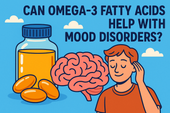
Can Omega-3 Fatty Acids Help with Mood Disorders?
Omega-3 fatty acids do more than support heart health — they can help balance mood, reduce depression, and calm anxiety. Discover how EPA and DHA nourish your brain, fight inflammation, and support emotional well-being from within. 🌊🧠
-

Vitamin D and Mood: The Sunshine Vitamin for Emotional Balance
Could the key to emotional balance be as simple as a little sunlight? Discover how vitamin D — the sunshine vitamin — influences serotonin, reduces inflammation, and helps you feel more positive and resilient year-round. ☀️💛
-

The Role of Magnesium in Reducing Irritability and Low Mood
Feeling on edge or emotionally drained? Magnesium could be the missing link between your body and your mood. Discover how this essential mineral reduces irritability, balances neurotransmitters, and helps your nervous system find calm again. 🌿✨
-
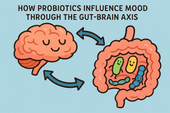
How Probiotics Influence Mood Through the Gut-Brain Axis
Discover how probiotics can do more than support your digestion—they can actually uplift your mood. This article explores the fascinating gut-brain axis and how balancing your gut bacteria through probiotics may help reduce anxiety, improve emotional stability, and support long-term mental well-being. 🌿🧠
-
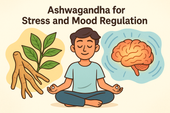
Ashwagandha for Stress and Mood Regulation
Discover how Ashwagandha, the powerful adaptogenic herb 🌿, helps your body manage stress and regulate mood. Learn how it balances cortisol, boosts GABA and serotonin, and supports emotional stability — helping you feel calm, focused, and resilient every day.
-
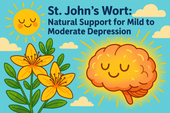
St. John’s Wort: Natural Support for Mild to Moderate Depression
Discover how St. John’s Wort, the “sunshine herb” 🌼, naturally supports mild to moderate depression. Learn how it boosts serotonin, balances mood, and promotes emotional resilience — with research showing its effectiveness compares to antidepressants, but with fewer side effects.
-
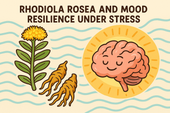
Rhodiola Rosea and Mood Resilience Under Stress
Discover how Rhodiola rosea helps your body adapt to stress 🌿. Learn how this powerful adaptogen balances cortisol, supports serotonin and dopamine, and strengthens emotional resilience — helping you stay calm, focused, and energized under pressure.
-

Chamomile and Lavender: Herbal Calm for Emotional Fluctuations
Discover how chamomile and lavender bring calm to emotional ups and downs 🌿. Learn how these two soothing herbs balance your nervous system, ease anxiety, and support restful sleep — naturally helping you find peace and emotional stability.
-
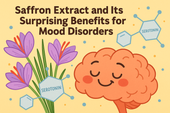
Saffron Extract and Its Surprising Benefits for Mood Disorders
Discover how saffron extract — the golden spice of joy 🌸 — can naturally support mood balance, ease anxiety, and lift mild depression. Learn what science says about its serotonin-boosting power, the ideal dosage, and how this ancient remedy compares to modern antidepressants.
-
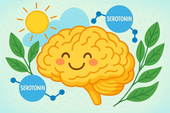
5-HTP and Serotonin: A Natural Path to Lifting Mood
Discover how 5-HTP naturally boosts serotonin 🌞 — the neurotransmitter behind mood, sleep, and emotional balance. Learn how this plant-derived compound supports happiness, reduces anxiety, and improves rest by helping your brain create more serotonin the gentle, natural way.
-
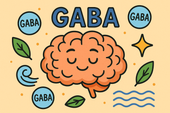
GABA Supplements for Reducing Anxiety and Mood Swings
Discover how GABA supplements can help reduce anxiety and balance mood naturally 🌿. Learn how this calming neurotransmitter works to quiet the mind, ease stress, and improve sleep — plus which nutrients and habits can boost your body’s own GABA production for long-term emotional stability.
-
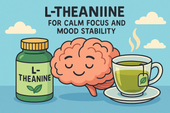
L-Theanine for Calm Focus and Mood Stability
Discover how L-theanine, the calming compound found in green tea 🍵, promotes focus, relaxation, and mood stability. Learn the science behind how it balances neurotransmitters, reduces stress hormones, and enhances clarity — helping you stay centered, calm, and productive without sedation.
-
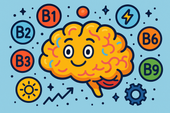
B Vitamins and Brain Chemistry: Supporting Energy and Emotional Balance
Discover how B vitamins power your brain chemistry ⚡. Learn how B6, B9, and B12 support serotonin, dopamine, and energy production — helping boost focus, mood, and emotional balance. From diet to supplements, explore how this vital nutrient group keeps your mind resilient and your energy steady.
-

N-Acetyl Cysteine (NAC) and Mood Disorders: What the Research Says
Learn how N-Acetyl Cysteine (NAC) supports brain health and mood balance 🧠. Discover how this antioxidant helps reduce oxidative stress, regulate glutamate, and improve emotional stability in depression, bipolar disorder, and anxiety — backed by cutting-edge psychiatric research.
-

Supplements for Bipolar Disorder: What May Support Stability
Discover the best supplements for bipolar disorder 🌿 that may support emotional stability and brain health. Learn how nutrients like omega-3s, magnesium, vitamin D, and NAC can help reduce inflammation, balance neurotransmitters, and complement traditional treatment safely.

















































